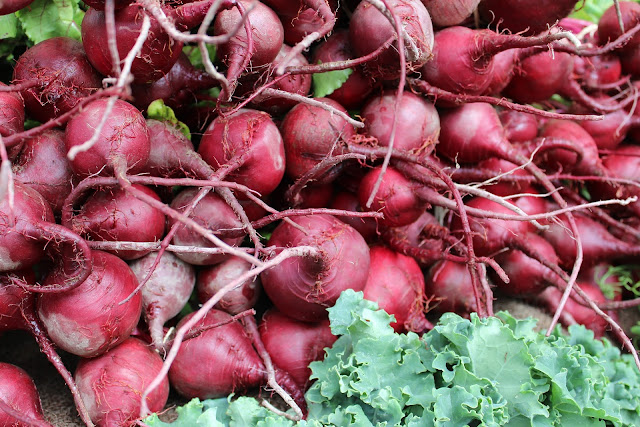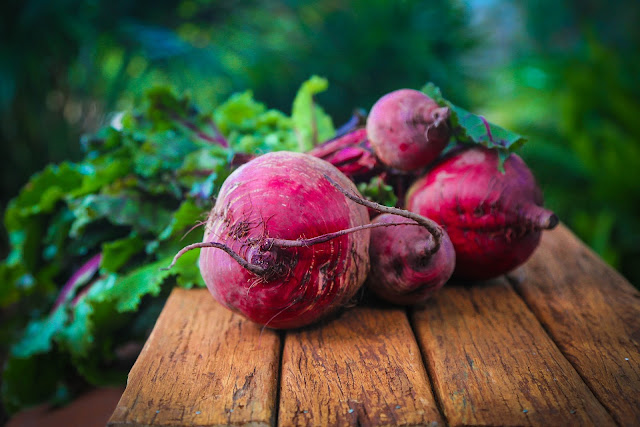Health benefits of beets
What are the benefits and nutrition of beets?
 |
| BeetRoot |
Health benefits of beetroot
1. Contains a lot of antioxidants in it.2. Natural detox for the body (kidney and liver)
3. May prevent hypertension
4. Increased stamina, ideal for athletes
5. Prevents Anemia
6. Reducing digestive problems
7. The right for those who want to lose weight
8. Overcoming the problem of dandruff
9. Natural food coloring
10. Natural hair dye-beet leaves are also useful.
How do you cook or process beets?
But also consider the following points before eating beets-share this:
Beetroot was first used by people in Africa thousands of years ago. Its root crop is very popular, and then spreads to Asia and Europe. Then these people grow and consume them in their area.
From the 16th to the 19th century, beets were used to produce several benefits. For example, fruit juice is used as a food coloring. At the same time, the sugar content in fruits is used as a sweetening mixture in foods and drinks. Moreover, around the 19th century, this fruit began to be used as a mixture of ingredients for the extraction and refining of sugar made from sugarcane.
What are the benefits and nutrition of beets?
Beets or red beets are a variety of reddish-purple tubers. The shape resembles potatoes, and the benefits of beets are also found in the roots and stems. Beets are usually consumed by making juice or processing into dishes with a soft texture.Although leaves can be prepared for cooking vegetables, beets are better known for their tubers, which contain many healthy substances for the body. Beets are high in carbohydrates, but very low in fat, calories, and protein.
So this is very good for those on a diet program. The content of betacyanin (a purple pigment) and betasanthin (a yellow pigment) found in beets makes the color from dark red to purple. Because of this concentrated color, beets
This fruit can often be found in America and England, but if you want to buy it, you can buy it at the supermarket. Come see the innumerable benefits of beets to the body in the explanation below.
Beet Nutrients
In beets you can find the following nutrients:Folic acid Kaliumen fiber vitamin C
Health benefits of beet
 |
| Beetroot |
Antioxidants are compounds that help neutralize the entry of harmful free radicals into the body. Antioxidants can also prevent oxidative stress and damage good cells in your body.
In addition, several studies have shown that antioxidants can protect the body against many types of chronic diseases such as heart disease, cancer, and diabetes.
The benefits of beets, of course, are also found in the high content of phytonutrients for the fight against diseases, antioxidants, vitamins and minerals. In fact, beets are considered one of the sources of fruits containing phytonutrients, i.e. betalain. Betalain is good for lightening skin tone. It can also help protect against certain types of cancer and other diseases in your body.
2. Natural detox for the body (kidney and liver)
The body can actually release toxins (detox), this happens naturally to prevent poisoning. Firstly, there is a kidney detoxification organ that functions to filter blood and produce urine.Then there are lungs that function to remove carbon dioxide from the inhaled oxygen. There is skin that pushes toxins and other harmful particles through the pores. In addition, there is also the liver, which plays an important role in detoxification, namely, removing toxins and other harmful substances from the blood.
To induce the body to flush out toxins, beets can help some of these organs, especially the kidneys and liver, maintain optimal performance. This was discovered as a result of research in Poland.
This study tested a beetroot mouse; the rat was indeed damaged in the cells in its body. After regular use of beets, studies published in the journal Phytotherapy Research showed that mice became healthier.
These results were found in mice, which showed that enzyme levels were good, and the detoxification organs in the body worked optimally to remove toxins in the body due to beet consumption. Do not forget to also eat beetroot juice, carrots and cucumbers, this is one of the best ways to cleanse the kidneys and liver of toxins that accumulate in both organs.
3. May prevent hypertension
It has been proven that drinking beet juice reduces high blood pressure. The nitrate content, which is also found in green leafy vegetables, lowers blood pressure.
The results of studies conducted by Barts and the London School of Medicine, as well as the Peninsula School of Medicine, offer this inexpensive way to reduce hypertension. According to prof. Amrita Ahluwalia of Barts & London School of Medicine, drinking beetroot juice and other nitrate-rich vegetables will keep your heart healthy.
4. Increased stamina, ideal for athletes
Studies at the University of Exter in the United Kingdom show that drinking beetroot juice can help athletes, usually athletes, be 16 percent stronger and more resilient, since nitrate levels can reduce oxygen burning in sports and reduce fatigue.
Beetroot has been proven to have the benefits of an athlete's diet. This is due to the fact that the nitrate content helps cells to better generate energy in the body, thereby increasing productivity.
In addition, a pilot study conducted in 2011 showed that regular consumption of beet juice can increase a person’s energy and stamina by 2, 8 percent more energy.
Other studies also show that nitrate supplements can reduce fatigue during exercise and can increase physical activity suitable for athletes.
5. Prevents Anemia
This reddish fruit is often associated with the color of the blood, which is why it is used to overcome the problem of anemia. In fact, what overcomes anemia is a high iron content that reactivates and regenerates red blood cells and supplies oxygen, which is good for the health of red blood cells.
6. Reducing digestive problems
Beets are a fiber-rich fruit that provides 3, 8 grams per serving of beets. Fiber content helps food move through the intestines. Fiber can also help soften stools to make your bowel or bowel movements comfortable, healthy, and regular.Research has shown that fiber intake in fruits can make bowel movements in people with constipation or difficulty making it so smooth. However, not only that, other studies have also shown that consuming fiber from beetroot foods is also good for digestive health and can protect conditions like intestinal infections, hemorrhoids and GERD or stomach acid.
If you experience digestive problems, nausea, pain, or diarrhea, you can drink beetroot juice mixed with carrots with one tablespoon of lemon or lime juice. Drinking beetroot juice mixed with one tablespoon of honey in the morning before breakfast will help reduce bloating.
7. The right for those who want to lose weight
In addition to being rich in nutrients, beets contain a lot of fiber but few calories. This is a good source of food if you are on a diet or want to lose weight. In fact, each cup of beet contains up to 59 calories and 3, 8 grams of fiber, or the equivalent of 15 percent of the fiber you need during the day.
When you eat fiber, it moves slowly within the alimentary canal .
It is this fiber that helps you cope with hunger and can remain full. According to one study in Boston, consuming 14 grams of fiber per day can lower your daily calorie intake by 10 percent, you know. Often, the results of your weight can gradually decrease to 4 pounds over 4 months if you regularly eat beets and eat healthy foods.
8. Overcoming the problem of dandruff
To solve the problem of dandruff on your beautiful hair, try boiling a little beetroot and then rub it on the delicate scalp. Leave it overnight wrapped in a towel. Rinse and rinse with shampoo the next day.
9. Natural food coloring
The betanine content, which gives a bright red color, can be used for natural food colors such as ice cream, wet cakes or cookies, as well as jelly.
10. Natural hair dye
If you are going to dye your hair with henna powder, try choosing a black color, and then mix it with red beet root juice. As a result, your hair will be black with burgundy and natural shades. Healthier and yet naturally beautiful.
Beet leaves are also useful.
 |
| Beetroot Leaves |
In addition to the root and pulp of the fruit, obviously, beet leaves are also useful and can be consumed, you know. The reddish-purple leaves of the fruit contain important nutrients such as protein, phosphorus, zinc, fiber, vitamin B6, magnesium, potassium, and copper. In addition, the leaves also contain large amounts of vitamin A, vitamin C, calcium and iron.
Beet leaves actually contain more iron than iron in spinach (other green leaf in the same botanical family). Then the nutritional value is also higher than the food in the root or meat of the fetus itself. Here are some of the benefits of leaves:
Help prevent osteoporosis by increasing bone strength Fighting Alzheimer's Strengthen your immune system by stimulating the production of antibodies and white blood cells.
How do you cook or process beets?
There are some ways to cook or process beets.
It can be eaten raw, stir, cook according to the recipe or even bake.
If you eat raw meta beets, it has a rather sharp, but slightly sweet texture. Usually, people add beets to salads or as an ingredient in their smoothie. Eating raw beets, you can get the overall nutrition of beets in a natural way.
In addition to being eaten raw, you can also mix beets with other ingredients in your cooking mix. When you cook beets, the texture of the meat will be softer and slightly sweeter. This fruit is often used with cheese or balsamic vinegar.
Roasting beets can also provide a stronger sweet feel. Since the sugar content of fried beets can be the original caramel liquid directly from sugar beets.
In addition to fried beets, you can boil or steam. It is important to note that cooking, baking, or boiling beets for too long can lead to the disappearance of some of the nutrient content. The good thing is, do not cook it until it is too ripe, add beets when the cooking is almost ready to be cooked.
This is useful to stop oxidation and maximize the nutritional value of your beets.
Also, choose fresh beets or pickled beets to get maximum nutritional value.
But also consider the following points before eating beets
Although beets have many benefits, there are some things to keep in mind when eating beets. Although rare, some people may be allergic to beets. If you experience food allergy symptoms such as itching, itching, or swelling, stop using beets immediately and talk with your doctor.
Also, remember that beets are one of the vegetables that contain a fairly high level of sugar. Eating one cup of beets can have a negative effect on raising blood sugar. Thus, often because of the high sugar content, beets are commonly used in the production of refined sugar, called "beet sugar" or "steam beet juice."
This type of sugar undergoes a reasonably high chemical change and may even damage or eliminate the nutritional value of beets themselves.
Therefore, it is important to pay attention to the bits that are processed and consumed. Beet sugar made from beetroot extract is just as dangerous as other types of refined sugar, such as white cane sugar or high fructose corn syrup.






Thanks for updating such an great blog on beet root benefits and how it help in completing nutrition in your body.
ReplyDeleteBeets and stool